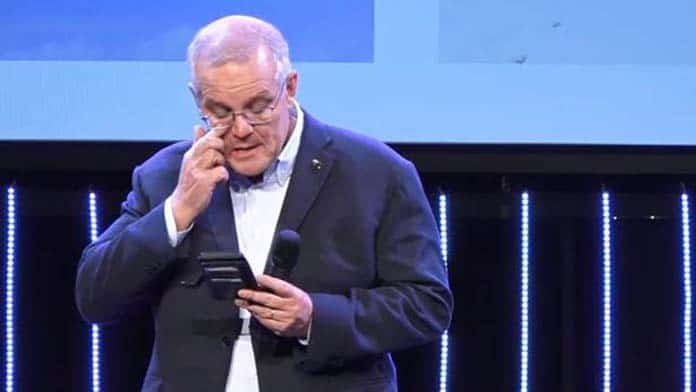Scott Morrison and the Liberals have been humiliated in an election result that has left the party in disarray. The vote is a rejection not just of Morrison himself but the sexism, anti-trans bigotry, refusal to act on climate change and indifference to workers’ cost of living that the Liberals represent.
Labor have won at least nine extra seats and will form the new government. But the result is not a decisive embrace of its agenda. Labor’s primary vote actually dropped 0.5 per cent, to its lowest level since 1934.
Many people were still unclear what Labor leader Anthony Albanese actually stood for. His small target strategy meant Labor promised very little change.
Support for both major parties has fractured, with their share of the vote down to 68 per cent between them, the lowest since the Second World War.
This saw The Greens win their highest ever vote at 12 per cent, including a breakthrough to win at least three lower house seats.
The Liberals were also rejected in their wealthy heartland in the inner cities. The teal independents have dealt the party a body blow, taking another five seats including the defeat of Treasurer Josh Frydenberg in Kooyong.
On the far right, One Nation and the United Australia Party shared 9.2 per cent of national vote. Worringly, they gained large votes between them in outer suburban Labor seats in Melbourne with 14.5 per cent in Scullin, 15.7 per cent in Calwell and 14.5 per cent in Holt.
There will now be at least 15 crossbenchers in the lower house, including The Greens and independents. Many of them hope to push Labor further over issues like climate change.
But Labor looks likely to end up with a majority in its own right after counting is complete. That means it will not need anyone else’s support in order to form government.
Albanese also make it clear throughout the campaign that he would not repeat the deal Labor made with The Greens in 2010 to form a minority government.
Speaking after the election result, Labor Deputy leader Richard Marles re-iterated that Labor’s existing policies on climate and other issues were, “what we sought a mandate for and that’s what we will take to the parliament”.
Labor’s agenda
This means we face one of the most right-wing Labor governments ever. Albanese made modest promises of increased funding for aged care and childcare.
Although he claimed that “Labor has a plan to lift wages” and declared that he would “absolutely” support increasing the minimum wage by 5.1 per cent to match inflation, Labor has no actual policies to deliver this.
Albanese even walked back his comments on the minimum wage, refusing to say whether he would include a figure in Labor’s submission to the Fair Work Commission, which will make the decision. And Albanese clarified that he thought it was only the lowest paid workers who should get the increase.
Labor accepted huge planks of the Coalition’s agenda, walking away from any of the efforts to tax the rich it took to the last election and supporting the Coalition’s stage three tax cuts valued at $15.7 billion in their first year, overwhelmingly going to the rich.
It has backed the Coalition’s warmongering against China and its obscene levels of military spending, including the $170 billion for nuclear subs. Albanese’s first act as Prime Minister will be to attend the Quad meeting with the US, Japan, and India, a grouping set up to confront China.
Albanese made much of his background growing up in public housing, but his plan to build 30,000 new public houses over five years is a drop in the ocean compared to what’s needed.
And although Albanese says he wants Australia to be a “renewable energy superpower” his climate targets are lower than those backed by the Business Council. He also supports opening new gas fields and coal mines, and will press ahead with the taxpayer-funded Kurri Kurri gas plant.
The increased Greens vote and the calls from the teal independents for higher climate targets are an indication of the desire for change.
But winning the action we need to avert climate catastrophe will need mass protests and a much more powerful climate movement outside parliament.
Even if The Greens hold the balance of power in the Senate, opposition in parliament won’t be enough to force Labor to act. Last time Labor was in government, it was willing to turn to the Coalition to help it pass legislation when it had to, instead of working with The Greens.
The wage rises needed to cope with the surging cost of living will also require more struggle outside parliament. The union movement needs to start campaigning now to demand a boost to wages. It was a mistake that the ACTU failed to organise stopwork rallies or the visible union campaign during the election that it has in the past.
The teachers and nurses’ strikes in NSW, as well as strikes by aged care workers and university staff at Sydney Uni are showing the way.
The scale of the defeat for Morrison and the Liberals is an indication of the desire for change. But it will take a fightback in the workplaces and on the streets to go beyond Labor’s small target promises and turn the mood for change into the action that can win it.





